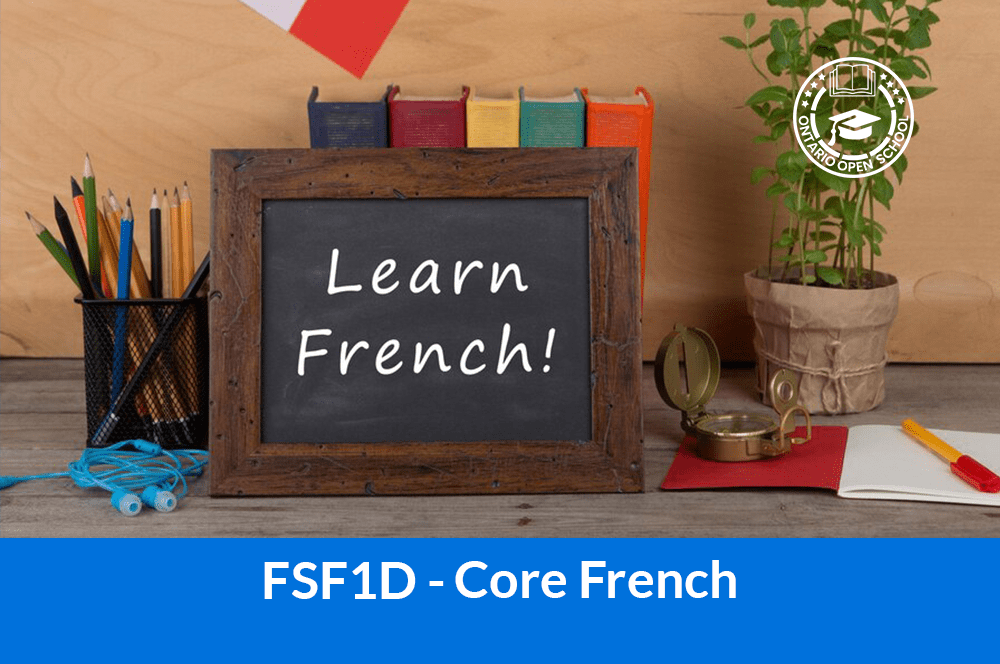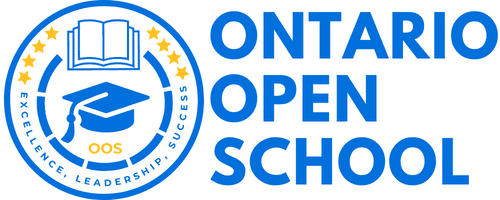- info@ontarioopenschool.com
- 647-494-4499
-
Unit 100 - 29 Gervais Drive, North York, ON.
M3C 1Y9
Copyright 2024 Ontario Open School Inc. All Rights Reserved.
This course provides opportunities for students to communicate and interact in French with increasing independence, with a focus on familiar topics related to their daily lives. Students will develop their skills in listening, speaking, reading, and writing by using language learning strategies introduced in the elementary Core French program, and will apply creative and critical thinking skills in various ways. They will also enhance their understanding and appreciation of diverse French-speaking communities and will develop skills necessary for lifelong language learning
Unit Order | Unit Name | Suggested Time |
|---|---|---|
| Unit 1 | Listening | 24 hours |
| Unit 2 | Speaking | 24 hours |
| Unit 3 | Reading | 27 hours |
| Unit 4 | Writing | 27 hours |
| Final Evaluation 30% | Culminating Project Final Exam | 6 hours 2 hours |
| Total | 110 Hours |
A variety of strategies are used to allow students many opportunities to attain the necessary skills for success in this course. The teacher uses a variety of whole class, small group and individual activities to facilitate learning. The following is a list of specific teaching/learning strategies that the teacher may use but is not limited to:
Purpose
The primary purpose of assessment is to improve student learning. Assessment relates directly to the expectations for the course.
A variety of assessments for and as learning are conducted on a regular basis to allow ample opportunities for students to improve and ultimately demonstrate their full range of learning and for the teacher to gather information to provide feedback. Assessment tasks relate to the success criteria set out in lesson plans. Success criteria allow students to see what quality looks like.
Evaluation is the process of judging the quality of student work in relation to the achievement chart categories and criteria and assigning a percentage grade to represent that quality. Evaluation is based on gathering evidence of student achievement through:
Assessment for Learning – we provide feedback and coaching. Assessment FOR Learning is the process of seeking and interpreting evidence for the use of learners and their teachers to decide where the learners are in their learning, where they need to go, and how best to go there.
Assessment as Learning – we help students monitor progress, set goals, reflect on their learning
Assessment AS Learning is the process of the explicit fostering of students’ capacity over time to be their own best assessors, but teachers need to start by presenting and modeling external, structured opportunities for students to assess themselves.
Assessment of Learning – we use assessments to provide evaluative statements about student achievement. Assessment OF Learning is the assessment that becomes public and results in statements of symbols
(marks/grades/levels of achievement) about how well students are learning. It often contributes to pivotal decisions that will affect students’ future.
ASSESSMENT TOOLS
|
Units |
Duration | Overall Expectations | AFL | AAL | AOL | K
25% |
A
25% |
C
25% |
T 25% |
||
|
A |
20 hours | A1-A3 | Student-Teacher Conferencing | Peer Assessment | Poster Presentation | √ | √ | √ |
√ |
||
|
70% |
B |
20 hours | B1-B3 | Worksheet
Class Discussion |
KWL Chart | Unit Test
Class Discussion |
√ | √ | √ |
√ |
|
|
C |
20 hours | C1-C3 | Worksheet
Pair Discussion |
Learning Log |
Unit Test Written Assignment |
√ | √ | √ |
√ |
||
|
D |
25 hours | D1-D3 | Homework
Student – Teacher Conferencing |
Reflective Discussion | Unit Test
Portfolio Assignment |
√ | √ | √ |
√ |
||
|
30% |
A1-D3 | Final Project 10% (Individual Presentation)
and Final Exam 20% (Written Component) |
√ |
√ |
√ |
√
|
|||||
Resources
Growing Success: Assessment, Evaluation and Reporting in Ontario Schools (2010)
http://www.edu.gov.on.ca/eng/policyfunding/growSuccess.pdf
Grading
Weighting of categories
| Knowledge/Understanding | Thinking/Inquiry | Communication | Application |
| 25% | 25% | 25% | 25% |

Course Grade | Grade 9 |
|---|---|
Course Code | FSF1D |
Course Category | French As a Second Language |
Course Type | Academic |
Course Delivery | Online |
Course Duration | 8hrs |
Course Credit | 0 |
Copyright 2024 Ontario Open School Inc. All Rights Reserved.
